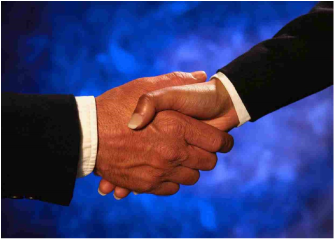
In late 2014, researchers at the University of Iowa found that job applicants with a good handshake were scored higher on ‘employability’. The students were considered to be more employable for their “more extroverted personalities and greater social skills”. And students with limp handshakes were judged to have less gregarious personalities and were in general, less impressive.
In the book he has co-authored with author Susan Kuchinskas, neuroscientist Paul Zak, Director of the Center for Neuroeconomics Studies at Claremont Graduate University in California and Professor of Economics and Neurology, writes with author Susan Kuchinskas :
“Touch primes the brain to release the hormone oxytocin. In Zak’s experiment, half the participants received a 15-minute massage and then played an economic game in which they exchanged real money. After being trusted by a stranger with money in the hope that they’d reciprocate, the brains of participants who got a massage released much more oxytocin than those who simply rested alone. And… those who received massages returned 243% more money to the stranger who showed them trust than those who rested.”
The release of oxytocin effectively helps establish a sort of social glue and economic lubricant. In his more recent research, Zak has shown that the human brain uses oxytocin to unconsciously assess if a person is trustworthy by accessing our memory of past encounters accessing all of our senses, including touch. If the stranger is a good match for other trustworthy people, the brain releases oxytocin, telling us it is safe to trust them.
Simultaneously, oxytocin causes the release of another brain chemical, dopamine, and this little charge helps us associate a trustworthy person with pleasure. The next time we meet this person, the trust assessment happens more quickly.
Zak’s research seems to suggest that if a firm handshake is good, a massage might be even better. But… unfortunately, a typical job interview or sales call doesn’t usually permit that kind of activity so, where does this leave us?
Touch is an important tool in building trust. And this is certainly influenced by a good handshake – a firm grip, eye contact and a vigorous up-and-down movement. In most business contact situations we get to exchange two handshakes – one at the beginning of the meeting, and one at the end so we should, in his words, “make the most of both handshake opportunities”.

 RSS Feed
RSS Feed